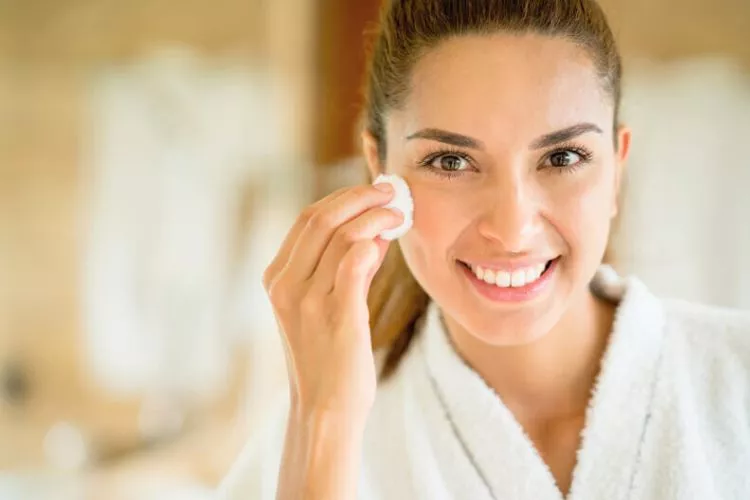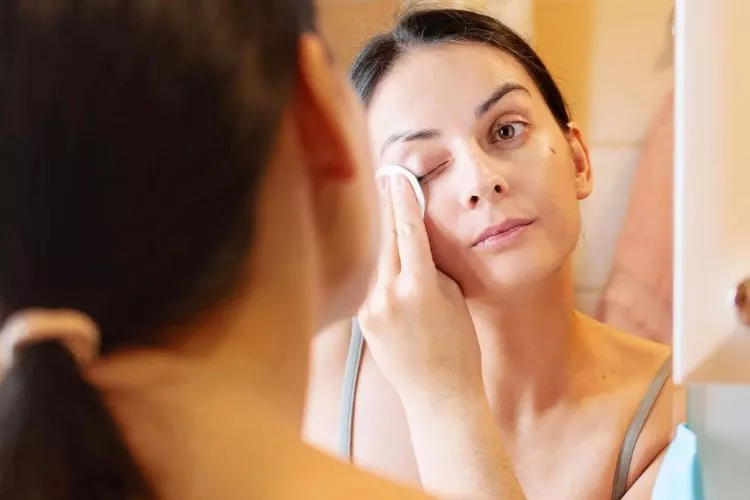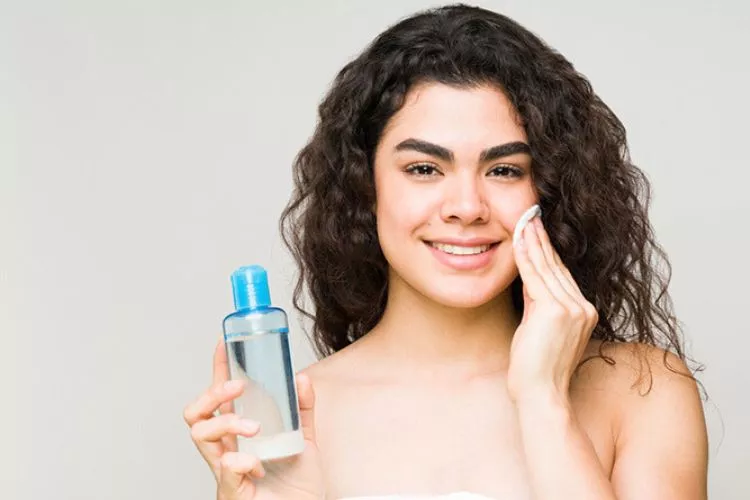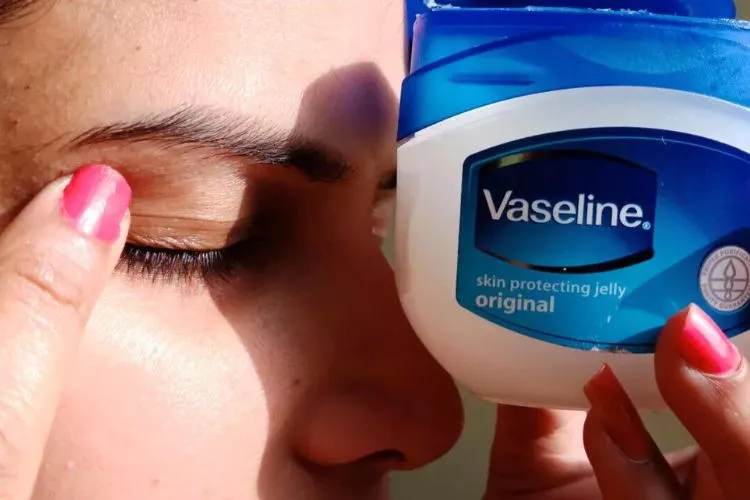Ever wondered if there’s a makeup remover sitting in your home, unutilized? Welcome to a surprising exploration of a common household item, baby oil.
So, does baby oil remove makeup?
Well, highly popular for its softening and healing properties, this delicate moisturizer might be the makeup remover you’ve been searching for.

We’ll delve into its effectiveness, benefits, and precautions to potentially transform your skincare routine. The unsuspecting baby oil just might become your next beauty best friend. Stay tuned!
Does baby oil remove makeup?
Yes, baby oil can indeed remove makeup. It works effectively to dissolve makeup because most cosmetics are oil-based. When rubbed gently on the skin, it loosens the makeup’s grip, making it easy to wipe off.
Baby oil isn’t just effective on regular makeup; it can also remove stubborn, waterproof mascara and eyeliner.
Besides its makeup-removing properties, baby oil adds moisture to your skin and prevents dryness.
However, despite these benefits, baby oil might not suit everyone. It can potentially clog pores, leading to acne or blackheads, particularly for those with oily or acne-prone skin.
Therefore, it’s recommended to perform a patch test before regularly using baby oil as a makeup remover.
In addition, make sure to cleanse thoroughly after using it to ensure no residue is left behind, which could lead to skin issues.
Does baby oil remove waterproof makeup?
Yes, baby oil can effectively remove waterproof makeup, including products like mascara and eyeliner. Baby oil can easily break down these hard-to-remove makeup items thanks to its content.
This effectiveness extends to both water-based and oil-based makeup.
Additionally, because of its smooth texture, using baby oil does not necessitate excessive scrubbing, which is beneficial for delicate skin areas like the eyes.
However, it is worth noting that using baby oil as a makeup remover can leave a residue on both the oil and makeup.
Therefore, cleaning thoroughly after using baby oil to remove makeup to avoid potential skin issues is important.
Does baby oil remove eye makeup?
Yes, baby oil can be used to remove eye makeup effectively. It is gentle on the skin and can break down various makeup products such as foundations, lipsticks, and eye shadows.
Many people find it successful in removing even stubborn eye makeup, including waterproof eyeliner and mascara.

However, be cautious when using baby oil around the eyes, as getting it into the eyes can cause discomfort and irritation.
Also, some individuals might experience clogged pores or acne if baby oil is not rinsed off thoroughly after use.
Will baby oil clog pores?
Yes and no, the answer is not a straightforward one when it comes to whether baby oil will clog pores.
Baby oil is considered noncomedogenic, meaning it’s not expected to clog pores. It has a comedogenic rating of 0-2, suggesting it’s unlikely to clog pores for most individuals.
However, the response to baby oil can vary with different skin types. Even though it’s generally classified as noncomedogenic, those with acne-prone or overly sensitive skin may experience clogged pores or irritation.

In such cases, while baby oil doesn’t directly cause clogging, it can enhance the likelihood of pore obstruction by entrapping dead skin cells and other substances inside the pores.
Therefore, while many people can use baby oil without issues, those with certain skin types should proceed cautiously and perhaps consider a patch test before implementing it into their regular skincare routine.
What happens if you put baby oil on your face every day?
Using baby oil on your face every day may provide certain benefits but simultaneously poses potential drawbacks.
For instance, baby oil can plump and soften the skin, forming a semi-breathable layer that helps retain its natural moisture. It can also reduce trans-epidermal water loss by creating a protective barrier between the skin and the environment.
However, despite these benefits, using baby oil daily might not suit everyone. For some, it may contribute to clogged pores or irritation, particularly those with acne-prone or sensitive skin2.
Additionally, while mineral oil (a key ingredient in baby oil) can maintain moisture and heal dry, irritated skin, skincare ingredients can affect different individuals differently.
In summary, applying baby oil to your face daily may work for some, but observing how your skin reacts is essential, especially if you have sensitive or acne-prone skin.
What can I use if I don’t have makeup remover?
I understand the importance of having alternatives handy when you’re out of makeup remover. Here are a few options:

- Petroleum Jelly: Known for its versatility, petroleum jelly is an excellent makeup remover alternative. Gently dab it on your skin, then swipe off the makeup with a cotton ball.
- Coconut Oil: Acting as a moisturizer and effective makeup remover, coconut oil can be a reliable substitute. It’s especially good for removing waterproof makeup.
- Micellar Water: A popular choice for makeup removal, micellar water can take off stubborn makeup and waterproof formulas while being gentle on your skin.
- Cleansers and Cleansing Balms: These can be useful for their dual function of removing makeup and cleaning your skin.
- DIY Makeup Remover Mix: A homemade mix of fresh aloe vera gel, raw honey, and oil (like olive oil for dry skin or sunflower/hazelnut oil for combination or oily skin) can be used as a makeup remover.
Remember, performing a patch test when trying out a new product or recipe is crucial to ensure it won’t cause any skin irritation.
frequently asked questions (FAQs)
u003cstrongu003eIs Johnson’s baby oil a makeup remover?u003c/strongu003e
Yes, Johnson’s Baby Oil can function as a makeup remover. Its mild formulation effectively breaks down various types of makeup, including foundations, lipsticks, and eye shadows. A few drops applied to a cotton ball can remove makeup without causing harsh skin reactions. However, care should be taken to avoid direct eye contact, as it might irritate. While effective, it’s also crucial to wash your face thoroughly afterwards to prevent potential pore-clogging.
u003cstrongu003eCan you use baby oil to remove waterproof mascara?u003c/strongu003e
Yes, baby oil can be used to remove waterproof mascara. The oil helps dissolve the composition of the mascara, making it easier to wipe away. To do this, apply a small amount of baby oil on a cotton pad and gently pass it over the lashes. It’s key to ensure the oil doesn’t get into the eyes to avoid discomfort and irritation. Given its efficacy, it’s a commonly used method for removing stubborn and waterproof makeup formulas.
u003cstrongu003eIs baby oil the best makeup remover?u003c/strongu003e
While baby oil works as an effective makeup remover, whether it’s the u0022bestu0022 largely hinges on individual skin types and preferences. For some people, baby oil, including stubborn, waterproof products, can soften the skin and remove makeup efficiently. But for others, particularly those with sensitive or acne-prone skin, baby oil might lead to clogged pores or irritation. Therefore, choosing a makeup remover that aligns best with your skin tone, type, and sensitivity level is crucial.
Benefits of Using Baby Oil as a Makeup Remover
Baby oil isn’t just a makeup remover; it offers several additional benefits that make it an appealing option for many people. Here’s why baby oil might be the right choice for some in their makeup removal routine:
1. Moisturizes and Softens the Skin
One of the standout features of baby oil is its moisturizing properties. Unlike traditional makeup removers that might leave your skin feeling dry or stripped, baby oil helps retain the skin’s natural moisture balance.
It acts as a barrier that locks in hydration, making your skin feel soft and smooth after use.
This moisturizing effect is especially helpful for individuals with dry or combination skin, as it prevents the skin from feeling tight and dehydrated after makeup removal.
If you often experience post-removal dryness, baby oil can provide a refreshing alternative that nourishes your skin.
2. Non-Irritating and Gentle
Baby oil is known for its gentle nature, making it a great option for sensitive skin. Many makeup removers can cause irritation or redness, especially around the delicate eye area, but baby oil’s mild formula is typically non-irritating.
It can break down even the most stubborn makeup without causing harm or discomfort to the skin. This makes it particularly beneficial for people with sensitive skin or those prone to irritation.
3. Affordable and Accessible
Baby oil is an affordable and widely available product, often found in most households or easily purchased from local stores.
This makes it a convenient and budget-friendly option for makeup removal, especially if you don’t want to invest in expensive makeup removers. Its versatility further adds to its value, serving not just as a makeup remover but also as a moisturizer and skin softener.
4. No Harsh Chemicals
Unlike some makeup removers that contain strong chemicals, baby oil is typically made from mineral oil, which is gentle on the skin.
For those concerned about using products with harsh ingredients, baby oil offers a more natural and soothing alternative.
Conclusion :
Baby oil is a capable makeup remover that is both cost-efficient and accessible. It efficiently breaks down various types of makeup, including stubborn and waterproof ones.
However, while its efficacy is undeniable, it’s not necessarily a one-size-fits-all solution. The individual’s skin type, sensitivity, and specific skincare needs are pivotal in determining suitability.
Particularly for those with acne-prone or sensitive skin, alternatives might be more appropriate to avoid potential clogging or irritation.
Therefore, conducting a patch test before integrating baby oil into your regular skincare regime is recommended.
